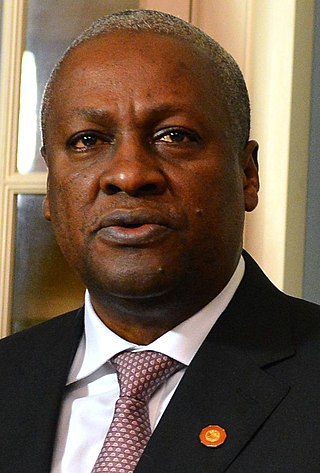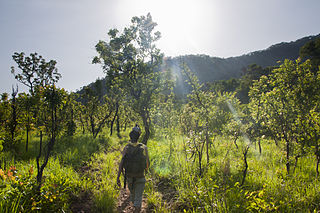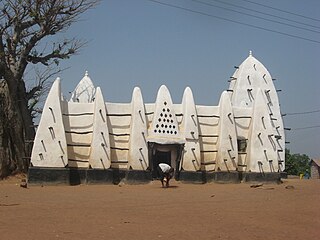Related Research Articles
The economy of Ghana has a diverse and rich resource base, including the manufacturing and exportation of digital technology goods, automotive and ship construction and exportation, and the exportation of diverse and rich resources such as hydrocarbons and industrial minerals.

Mimaropa, officially the Southwestern Tagalog Region, is an administrative region in the Philippines. It is one of two regions in the country having no land border with another region. The name is an acronym combination of its constituent provinces: Mindoro, Marinduque, Romblon and Palawan.

John Dramani Mahama is a Ghanaian politician who served as President of Ghana from 24 July 2012 to 7 January 2017. He previously served as Vice President of Ghana from January 2009 to July 2012, and took office as president on 24 July 2012 following the death of his predecessor, John Evans Fiifi Attah Mills.

Agriculture in Ghana consists of a variety of agricultural products and is an established economic sector, providing employment on a formal and informal basis. It is represented by the Ministry of Food and Agriculture. Ghana produces a variety of crops in various climatic zones which range from dry savanna to wet forest which run in east–west bands across Ghana. Agricultural crops, including yams, grains, cocoa, oil palms, kola nuts, and timber, form the base of agriculture in Ghana's economy. In 2013 agriculture employed 53.6% of the total labor force in Ghana.

The water supply and sanitation sector in Ghana is a sector that is in charge of the supply of healthy water and also improves the sanitation of water bodies in the country.

The regions of England, formerly known as the government office regions, are the highest tier of sub-national division in England. They were established in 1994 and follow the 1974–96 county borders. They are a continuation of the former 1940s standard regions which followed the 1889–1974 administrative county borders. Between 1994 and 2011, all nine regions had partly devolved functions; they no longer fulfil this role, continuing to be used for limited statistical purposes.

The Council for Scientific and Industrial Research (CSIR) was established by NLC Decree 293 of October 10, 1968 amended by NLCD 329 of 1969, and re-established in its present form by CSIR Act 521 on November 26, 1996. The genesis of the council however, dates back to the erstwhile National Research Council (NRC), which was established by the government in August 1958 to organize and coordinate scientific research in Ghana. In 1963, the NRC merged with the former Ghana Academy of Sciences, a statutory learned society. Following a review in 1966, the academy was reconstituted into, essentially, its original component bodies, namely a national research organization redesignated the CSIR and a learned Society, designated the Ghana Academy of Arts and Sciences.
Ghana'sMinistry of Food and Agriculture (MOFA) is the government agency responsible for the development and growth of agriculture in the country. The jurisdiction does not cover the cocoa, coffee, or forestry sectors. The primary organisation and main area of the presidential administration of Ghana is the nation's Ministry of Food and Agriculture (MOFA), which is in charge of creating and carrying out policies and plans for the agricultural sector within the framework of an efficient national socio-economic development and prosperity agenda. The Ministry's plans and programmes are created, coordinated, and put into effect using frameworks for policy and strategy using a sector-wide approach. The Food and Agriculture Sector Development Policy II and the Medium Term Agriculture Sector Investment Plan were both developed with the aid of MOFA in relation to this.

The Environmental Protection Agency, is an agency of Ministry of Environment, Science, Technology and Innovation, established by EPA Act 490 (1994). The agency is dedicated to improving, conserving and promoting the country’s environment and striving for environmentally sustainable development with sound, efficient resource management, taking into account social and equity issues. It oversees the implementation of the National Environment Policy. EPA Ghana's mission is to manage, protect and enhance the country’s environment and seek common solutions to global environmental problems. Its mission is to be achieved through an integrated environmental planning and management system with broad public participation, efficient implementation of appropriate programs and technical services, advice on environmental problems and effective, consistent enforcement of environmental law and regulations. EPA Ghana is a regulatory body and a catalyst for change to sound environmental stewardship.

Genetically Modified (GM) food crops were introduced into Ghana in 2013. GM crops are controversial around the world for various reasons and Ghana is no exception. Groups against its introduction include Food Sovereignty Ghana, The Coalition For Farmer’s Rights, Advocacy Against GMOs, Ghana Catholic Bishops’ Conference and the Convention People’s Party (CPP). They argue that genetically modified food is not conducive to good health and is neo-colonialist in nature. That is, it hands control of the food supply to rich nations, which threatens food sovereignty and the national interest.
Mahama Shaibu born and raise in Tamale, the northern part of Ghana, is a broadcast journalist who once work with Zaa Radio -Tamale and Joy FM -Accra, both in Ghana. He was a part-time lecturer at the International institute of journalism in Tamale.
The National Drug Authority (NDA) is a government-owned organisation in Uganda, mandated to regulate drugs in the country, including their manufacture, importation, distribution, and licensing.
Grace Afua Bediako is a Ghanaian statistician and the former head of the Ghana Statistical Service. She is currently a member of the National Development Planning Commission (NDPC).

The Oti Region is one of the six newly created regions of Ghana in December 2018. The region was carved out of the northern part of the Volta Region and will be in fulfillment of a campaign promise made by New Patriotic Party. Prior to the 2016 Ghanaian general election, the then candidate Nana Akufo-Addo declared that when elected, he would explore the possibility of creating new regions out of some of the existing regions in Ghana in order to bring government closer to citizens. The Region was inaugurated on May 14, 2019. It has Dambai as its Regional Capital. The people of Oti region have for more than 60 years always wanted to have a region of their own before its creation in 2018 by the President Nana Addo Dankwa Akufo-Addo led government in December 2018.

The Ahafo Region is a newly created region in Ghana with Goaso as its capital. The region has administrative and governmental legislature like all the ten already existing regions in Ghana. The region was carved out of the south-eastern part of the Brong Ahafo Region and was in fulfillment of a campaign promise made by New Patriotic Party. Prior to the 2016 Ghanaian general election, the then candidate Nana Akufo-Addo declared that when elected, he would explore the possibility of creating new regions out of some of the existing regions in Ghana in order to bring government closer to citizens.

Climate change in Ghana is impacting the people in Ghana in several ways as the country sits at the intersection of three hydro-climatic zones. Changes in rainfall, weather conditions and sea-level rise will affect the salinity of coastal waters. This is expected to negatively affect both farming and fisheries.

The Savannah Region is one of the newest regions of Ghana and yet the largest region in the country. The creation of the Region follows presentation of a petition by the Gonja Traditional Council, led by the Yagbonwura Tumtumba Boresa Jakpa I. Upon receiving favourable responses from all stakeholders in the Northern Region, the Brobbey Commission, a referendum was conducted on the 27th December 2018. The result was a resounding yes of 99.7%. The President of the Republic of Ghana signed and presented the Constitutional Instrument (CI) 115 to the Yagbonwura in the Jubilee House, Accra on 12 February 2019. The launch was well attended by sons and daughters of Gonjaland including all current and past Mps, MDCEs and all appointees with Gonjaland descent. Damongo was declared the capital of the new Savannah Region. It is located in the north of the country. The Savannah Region is divided into 7 districts; Bole, Central Gonja, North Gonja, East Gonja, Sawla/Tuna/Kalba, West Gonja, North East Gonja and 7 Constituencies; Bole/Bamboi, Damongo, Daboya/Mankarigu, Salaga North, Salaga South, Sawla/Tuna/Kalba and Yapei/Kusawgu. The capital of Bole district is Bole; East Gonja municipal is Salaga; West Gonja district is Damango; Sawla Tuna Kalba district is Salwa; Central Gonja is Buipe; North Gonja is Daboya; and North East Gonja is Kpalbe
Alhassan Andani is a Ghanaian economist and grandson of Naa Andani who ruled Dagbon in the colonial era. He serves as the current chief executive director of Stanbic bank. He holds the position of Chairman of Council for Scientific & Industrial Research, Chairman of SOS Children's Villages Ghana and serves on the board of Gold Fields Limited. Alhassan Andani is Independent Non-Executive Director of the company. Mr Andani is currently CEO and executive director of Stanbic Bank Ghana; the board chairperson of the Ghana Council for Scientific and Industrial Research (CSIR), a director of SOS Villages Ghana, and has held other corporate directorships in the past. He holds BSc (Agriculture), University of Ghana; MA, Finafrica Institute in Italy.
Alberta's Ministry of Health is a ministry of the Executive Council of Alberta whose major responsibilities include setting "policy and direction to achieve a sustainable and accountable health system to promote and protect the health of Albertans."
Gilbert Seidu Iddi is a Ghanaian academic and politician, who is a member of the National Democratic Congress. For more than 15 years, Iddi worked in several senior management positions International Development and Agricultural agencies including managing an extensive agricultural programme funded by the International Fund for Agricultural Development (IFAD). He served as Northern Regional Minister during the Rawlings era between 1997 and 2001. He served as the chief executive officer of the Savannah Accelerated Development Authority (SADA) from 2011 to 2013.
References
- ↑ "Savannah Accelerated Development Authority (SADA)". Ministry of Food & Agriculture, Republic of Ghana. Retrieved 30 April 2014.
- ↑ "The Savannah Accelerated Development authority (sada) –is the north well positioned for it?". News Blog. Modern Ghana. 1 October 2009. Retrieved 30 April 2014.
- ↑ "Savannah Accelerated Development Authority bill passed into law". GNA. Ghana Web. 30 July 2010. Retrieved 30 April 2014.
- ↑ "Veep Holds Discussions On Savannah Accelerated Development Authority". Northernghana.com. 2008. Retrieved 30 April 2014.
- ↑ "SADA ACT & INSTITUTIONAL DEVELOPMENT". SADA Ghana. Retrieved 24 November 2014.
- ↑ "Overview of SADA". SADA Ghana. Retrieved 24 November 2014.